Social Media Advertising in 2025 (+ Tips & Best Practices)
Looking for the “one magical way” to hack social media advertising as part of your social media strategy?
I hate to break it to you.
There isn’t one.
After all, algorithms, behavioral trends, and social media features change on the daily.
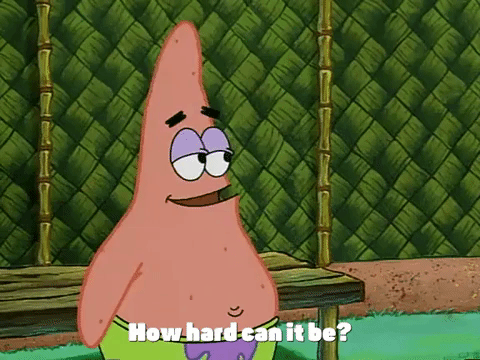
Not to worry — we got you.
Follow our 11 tips and best practices to set your brand up for the best chance of success.
But first, what is social media advertising?
What Is Social Media Advertising?
Social media advertising differentiates itself by its next-level targeting capabilities.
No need to rub your lucky rabbit’s foot or pray to the astrology gods hoping that your latest post goes viral.
Instead, you can throw some cash at it to make sure your phenomenal content marketing gets the eyeballs on it that are the most likely to lead to conversions.
How is social media used for advertising?
Check out this quick, super helpful vid to bring you up to speed. 👇
Our post will dive into social media advertising advantages and disadvantages.
You’ll find loads of paid social media ad benefits.
Conversely, we’re happy to report that there is really only one downside.
It’ll cost you.
(That’s why it’s called paid social media)🙄
The good news is, that each social platform offers ultra-flexible rates to suit every type of budget.
Which we’ll cover later.
For now, let’s rock on with the benefits.
Benefits of Social Media Advertising
Check out this shocking statistic:
On average, businesses utilizing social media advertising can expect a 280% return on investment (ROI).
Sheeesh.
If that alone hasn’t sold you, here are 5 more reasons brands and marketing teams are vibing social media advertising.
1. Hyper-targeted with a broad reach.
One of the main reasons social media advertising is so effective is that you can hyper-target your ideal clients.
You can segment your audience based on demographic, geographic, psychographic, and behavioral characteristics.
You can even get really crazy and target businesses with firmographic segmentation.
This ensures you get the right message to the right people, increasing the likelihood of conversions.
2. Brand recognition & recall.
Social media ads boost brand awareness by showing your content to users who don’t already follow you.
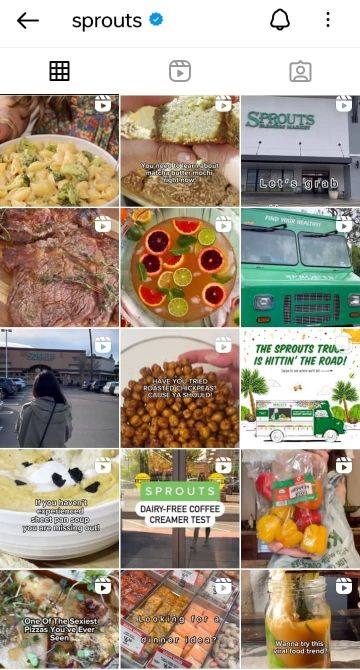
This targeted advertising can lead to new followers, increased reach, and enhanced user engagement.
It also generates a considerable lift in ad recall.
So, continue to roll out entertaining and informative paid ads and organic posts.
That way, when your followers are ready to whip out the plastic, your brand will be top of mind.
3. Increase conversion rates.
Do you already have a significant social media presence from your organic marketing strategy? And want to engage previous or current customers?
Paid social ads can do it all.
Post more kick-ass content, and you’ll increase inbound traffic, leading to more conversions.
4. Humanize Your Brand.
By engaging with your audience when they comment, they’ll quickly realize they’re dealing with an actual human, not a robot.

This gives users a better perception of your brand, making them feel more loved and valued.
5. Gain insights about your target audience.
Social media analytics provide profound insights into your social media management.
Along with ad performance data, you can get loads of information on the metrics that matter most.
Such as:
- Which ads result in the highest digital engagement.
- The demographics of your social media audience.
- Social ad performance vs. organic social.
Leverage these insights to level up your ads and create more targeted ad campaigns.
So, where should you post your epic content?
Let’s dive into the different platforms.
Social Media Platforms for Advertising
It doesn’t matter whether you’re a big player or the new kid on the block.
Advertising on any of the social media platforms can get your brand noticed.
However, while they all offer various advertising options, it doesn’t mean you should use all of them.
First, you must learn which networks are most popular with your target audience.
Not sure where your peeps are?
Turn up the volume on the conversations representing solid business opps and use social listening tools.
Let’s have a looky-loo at the most common types of social media advertising used on each of the socials.
Top stats:
- Facebook is 90% of marketers' social media platform of choice.
- Americans spend 33 minutes on the social media channel daily.
Who uses it: Facebook is the most popular social media network for users aged 35-44. It’s least popular with women aged 16-24.
Here are a few Facebook advertising options to power up your social media marketing campaign:
Image Ads

These single high-quality images are excellent for campaigns with solid visual content.
Video Ads
Social media video marketing is crushing it, with short-form vids reported as the most engaging type of in-feed social content in 2022.
They’re a great way to educate your audience about product features or tell your brand story.
Carousel Ads
Show off multiple products, highlight the features of a single product, or tell a compelling story.

Each ad can include its own headline, description, landing page, or call to action (CTA).
Collection Ads
This mobile-only, high-converting ad format features one primary image or video with 4+ smaller photos.

When customers tap on your ad, they’re taken to a fast-loading, visual experience to browse or learn more about the ad offer.
Messenger Ads
Messenger Ads are an ultra-personal way to connect directly with potential customers and treat them like fam.

Depending on how you treat your friends, of course. We recommend avoiding profanity and clapbacks. 😏
This format can help you develop customer loyalty that can lead to an above-average conversion rate.
Top stats:
- Instagram has 2 billion monthly active users.
- US Adults spend 30 minutes per day on the platform.
Who uses it: Instagram is most popular with users aged 18 to 44 and is the social network of choice for Gen Zers.
Besides your standard image/video ads, Instagram ad formats also include:
Carousel Ads
This format is best used to showcase product variations or different angles of a single product.
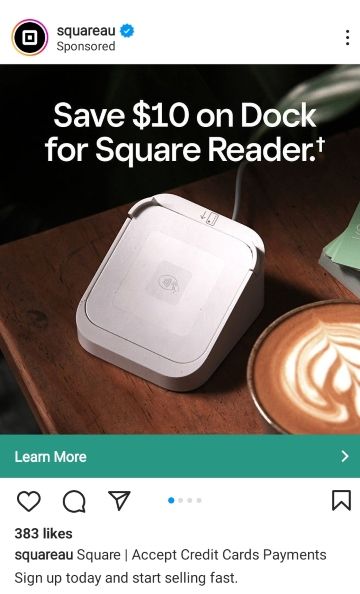
Collection Ads
Display images in a single layout, allowing users to look at all your photos at once.
Shopping Ads
Include a product tag in your ad or image. Customers can tap it to learn more or buy directly from the social media app.

Instagram Story
This ad type disappears after 24 hours.

Use it to maximize brand reach and social media conversions and instill a sense of urgency in your audience.
Top stats:
- 53% of Twitter users are more likely to be the first to buy new products.
- US Adults spend an average of 35 minutes per day on the platform.
Who uses it: Worldwide, 38.5% of Twitter users are 25-34, making it the largest age group using the app.
What are the examples of social advertising on Twitter? Options include:
Promoted Ads
Like regular Tweets, Promoted Ads can be images, videos, carousels, moments, or text-only.
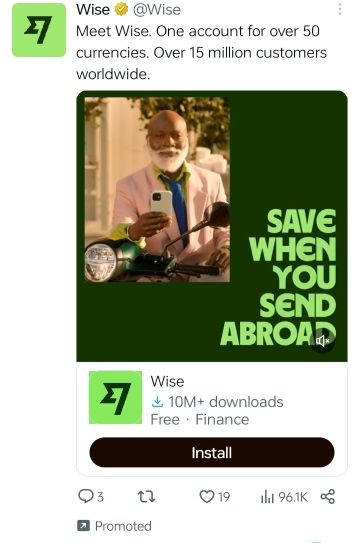
Pay to display your content to people who don’t follow you on Twitter.
Amplify Ads
Amplify Ads are short videos that play before the video content a user has chosen to watch.
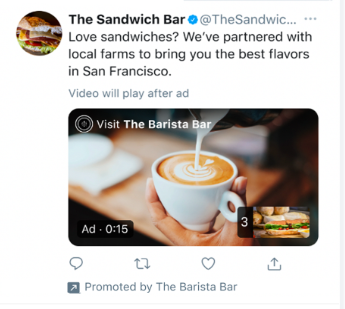
This ad type helps increase campaign awareness and ad recall.
Takeover Ads
Takeover Ads are premium, mass-reach placements, leading to a boost in social media engagement.
You’ll find two types of Twitter Takeover Ads:
Trend Takeover
These ads appear in the What’s Happening section and the trending tab on the Explore screen.
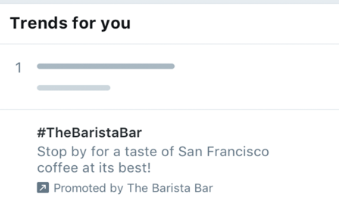
Timeline Takeover
Welcome users with your Timeline Ad when they open the app for the first time that day.
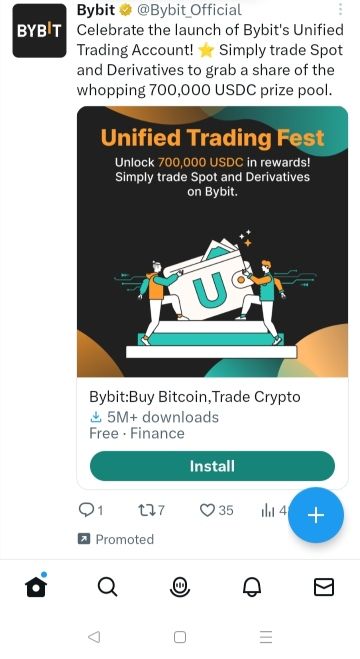
Twitter Live
Twitter Live is accessible to any Twitter user, but paid Twitter Live helps maximize reach.
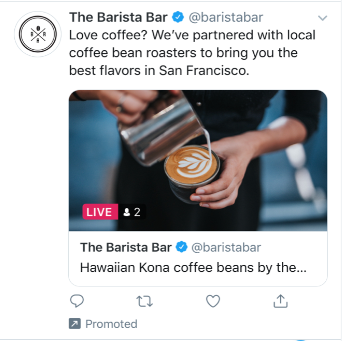
This is a fantastic option for promoting your content, product launch, fashion show, conference, etc.
Collection ads
Highlight up to 6 unique products or services, where users can view all your features without having to swipe through.
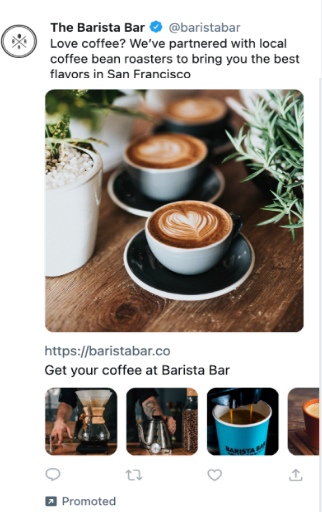
Snapchat
Top stats:
- In 2022, Snapchat generated $4.6 billion in revenue – a 12% increase YOY.
- On average, 375 million Snapchatters use the app daily.
Who uses it: Snapchat has over 75% of users aged 13-34, with 51% being female.
Get noticed with the following ad formats:
Single Image and Video Ads
Make an immediate impact by creating full-screen ads that display between snaps. Users swipe up to take action.

Collection Ads
Collection Ads give Snapchatters a frictionless way to shop.
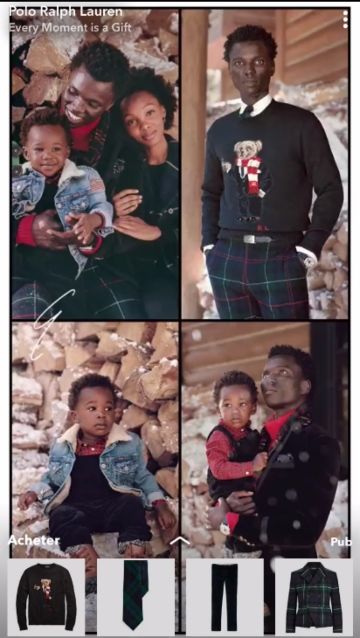
Showcase a series of products through four tappable tiles.
Story Ads
Story Ads are a series of 3-20 single Image or Video Ads shown between content or through a branded tile in the Discover section.
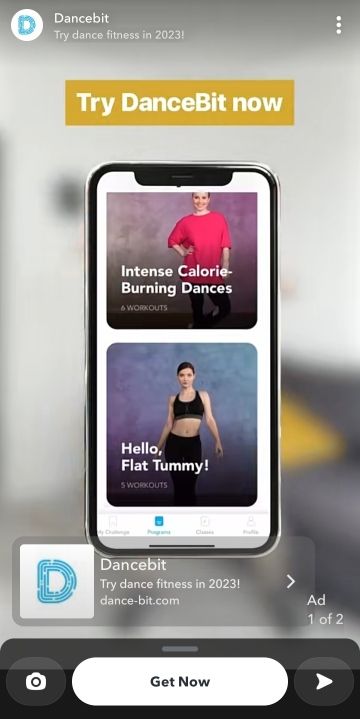
Lens AR Experience Ads
AR Lens Ads allow brands to develop memorable interactive moments and connect with users.

Create a “face lens” or a “world lens,” and Snapchatters apply them to their content.
Filter Ads
Users can add these artistic static image overlays to Snaps to spark conversations.
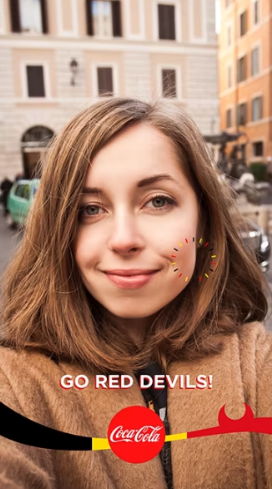
Commercial Ads
These non-skippable ads play in-between content to engage with the audience and drive brand awareness.
Source | Snapchat
Top stats:
- LinkedIn has 900 million users – the highest user rate in the world.
- 49 million people job search on LinkedIn every week.
Who uses it: 57% of the platform’s users are male, compared to 43% of female users. Almost 60% of users are aged 25 to 34.
Sponsored Message Ads
Make personal connections with audiences and spark immediate conversations.
Share an event registration, promote a free product trial, or educate people about your offerings.
Sponsored Content
Build engagement, boost brand awareness, and drive leads through striking images, documents, videos, carousels, or event ads.

Dynamic Ads
Create personalized ads using information from recipients’ profile data, such as company name, job title, photo, etc.

PPC Text Ads

Text Ads get your brand in front of the audiences who matter most and drive high-quality leads.
Top stats:
- Pinterest is the second-most visited website in the US.
- Advertising on Pinterest is 2.3x more cost-efficient per conversion than other social media channels.
Who uses it: 60% of Pinterest users are women.
Pinterest is decorated with whimsical wedding pics, clever cooking vids, and fab fashion reels.
Advertise using the following formats:
Standard Image and Video Ads
Image and Video Ads appear on the home feed. Video Ads are beneficial for sharing a story or how-to process.
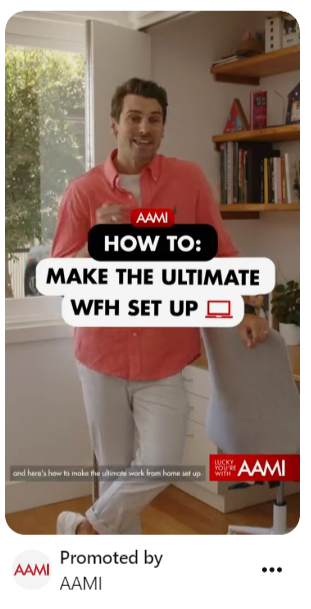
Shopping Ads
Shopping Ads drive sales and conversions by converting all your product Pins into ads with a link to your shop.

Carousel Ads
Bring another layer of depth by including multiple images in one pin for users to swipe through.



Source | Pinterest
Collections Ads
This hybrid format mixes lifestyle imagery and video and displays only on mobile.

YouTube
Top stats:
- People spend an average of 19 minutes per day watching videos on YouTube.
- Over 70% of users report YouTube is where they discover new brands.
Who uses it: 77% of YouTubers are aged 15-35. 80% of kids under 11 spend time watching videos.
If you’re considering advertising on YouTube, we recommend you up your game with influencer marketing. The platform is a wildly popular medium with influencers who have 1 million+ followers.
Social media advertising examples on YouTube include:
In-Stream Ads
In-stream ads are effective in increasing brand awareness and exposure.
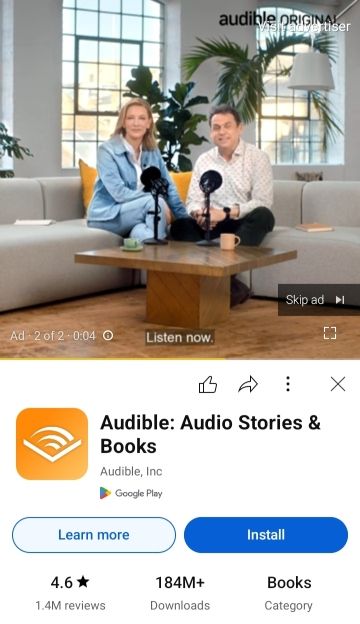
Choose between:
Skippable Ads
Viewers can skip through advertisements after 5 seconds. You don’t pay a single penny for Skippable Ads unless users:
- Watch 30 seconds of the ad
- Finish watching the ad
- Click on the ad
Non-skippable Ads
Most of us can’t resist hitting that pesky “skip” button.
So, nip that in the bud with a non-skippable video ad that plays for 15 seconds. Users must watch your ad in full before they can view the video.
Bumper Ads
These quick ads are unskippable and 6 seconds long. Bumper ads switch on when you turn on skippable or non-skippable ads.
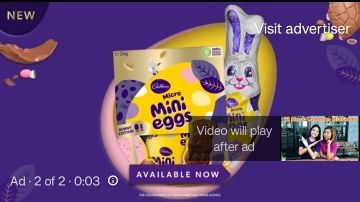
TikTok
Top stats:
- Tiktok is THE most downloaded app as of 2022, with more than 3.5 billion downloads.
- The US has 113 million monthly unique users.
Who uses it: 47% of TikTok users are under 30, and 57% are female.
Ads on TikTok are still relatively new; however, their advertising options are growing and include:
In-Feed Ads
Appearing in a user’s For You Feed, this ad format is designed to capture attention and drive customer engagement.

Branded Hashtag Challenge Ads
Pay to get your branded challenge at the top of the trending list and encourage user-generated content submissions.
Spark Ads
Boost different video types to maximize their impact — your own or user-generated ones that mention your brand.

Branded Effects
Create and share custom filters, stickers, and effects that boost TikTok user engagement across the globe.



Source | TikTok
TopView Ads
These full-screen ads are great for gaining brand reach and mass impressions. They play at the top of users’ feeds when they open the homepage.
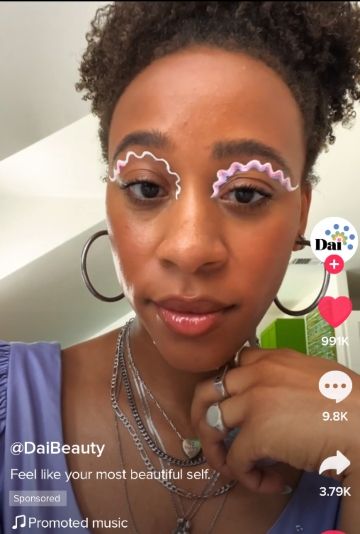
Now we’ve explained the different social media advertising formats, you want more deets on the dollars, right?
Let’s get down to brass tacks.
How much does social advertising cost?
You’ll find a whole boatload of variables that can affect the price of your social media ads.
We’re talking time of day, demographics, industry, and more.
The good news is, how much you spend is up to you.
Most platforms typically charge by interaction type:
➡️Cost per click,
➡️Cost per conversion,
➡️Cost per impression, and
➡️Cost per view.
To give you a better idea of how much social media advertising costs, we’ve tabled how much each platform charges per ad click.

Two platforms that go against the grain are Snapchat and Tiktok.
Snapchat charges per 1,000 impressions (CPM), and the average CPM is $2.95.
TikTok ads start at $10 per CPM, with a minimum social media ad spend of $500 per ad campaign.
Tips & Best Practices to Build a Social Media Advertising Strategy
Before crafting your legendary social media advertising strategy, check out these tips:
1. Identify your business goals.
Setting realistic business goals is vital to creating a successful digital marketing campaign.
What is it you want to achieve?
Boost brand awareness?
Gain more social media followers?
Or swoop up some prime real estate on Google’s SERP?
Nail down the specifics to help track the right metrics and KPIs associated with your digital marketing campaign.
2. Research your target audience.
Before you sell anything, know your audience.
One brand that failed to do its research was fashion giant Dolce & Gabbana.
The company released an ad in 2018 showing a Chinese woman trying to eat Italian food with chopsticks.
And boy, were its Chinese audience salty.
Not only did it spark insane media backlash, but several stores dropped D&G, and they were forced to cancel their upcoming Shanghai show.
Big oof.🤦♀️
The more you learn about your audience, the better you can refine your social media advertising with messages that resonate with them.
3. Build buyer personas.
These are semi-fictional depictions of your best potential buyers based on existing customer behavior analysis.
Social media advertising allows you to get uber-specific with demographics. Narrow down your buyer personas based on age, location, occupation, income, etc.
Or consider any other factors that commonly influence purchasing decisions.
After all, it’s pointless advertising to soccer moms in Connecticut if your audience is young male gamers hanging out in their mom’s basements in Seattle.
4. Nail down your budget.

Setting a budget can help you keep track of costs and, ultimately, your ROI.
Plus, you can assess where you’re winning (or flailing).
The best news is, you don’t have to fork out insane amounts of money on social media advertising.
Giving you the best bang for your advertising buck.
5. Analyze your organic content.
You’re likely already posting content on various socials every day.
Perhaps you’ve noticed that some posts resonate with followers and others don’t.
Track which posts are clicked, liked, shared, and commented on.
If something works on your organic posts, it’s a safe bet that it’ll work with paid ads too.
6. Impressions vs. engagement.
To keep your budget in check, consider whether you want impressions or engagements.
What’s the difference?
- Impressions – the number of times your content is presented to your audience. You pay each time a user’s eyeballs hit your ad.
- Engagement – the number of interactions people have had with your content. E.g., likes, comments, retweets, and shares.
Both campaigns can be valuable in your social media marketing campaign. You just need to choose the right one that aligns with your business goals.
7. Create ads for mobile marketing.
As 99% of people worldwide access networks on a mobile device, your ads must be mobile-ready.
You’ll also need to ensure your mobile branding is legible, the text is large and clear, and the graphics are poppin’.
Got a brick-and-mortar business?
Geofencing can help you target mobile users when they’re close enough to walk through your door.
8. Use eye-catching visuals.
Social media users typically scroll through their news feed until something catches their eye.
Which means you’ve got a nanosecond to grab their attention.
That means you need to design something so spectacular that they can’t peel their eyes off your ad.
Play around with colors, icons, or fonts, and be sure to include a click-worthy headline.
9. Utilize remarketing.
This may sting a little, but most users won’t remember you from a single interaction.
They may have landed on your site looking for answers to a problem.
But they could still be utterly oblivious to the awesomeness of your brand.
In that case, reel ‘em in with remarketing.
You can reintroduce yourself, giving you a second chance to boost sales and conversions with a snappin’ online ad or campaign.
If you’ve brought your A-game, your ad will convince them to click and follow through with the purchase.
10. Analyze results.
Ad analytics perform a deep dive into your social media advertising effectiveness.
Beyond engagement metrics and clicks, marketing analytics can help you understand:
- The performance of your organic social media versus paid.
- Your ROI on paid campaigns.
- Opportunities for future campaign optimization.
That way, you can see whether you’re smashing your goals or where you need to tweak your social media strategy going forward.
11. Test your ad performance.
Next, test some ads with small audiences to determine what works best.
Then use the winning ad in your primary social media advertising campaign.
This method of testing one ad against another is known as A/B testing.
When you regularly perform A/B testing, you can quickly refine your social media strategies on the fly.
Transform Your Business with Social Media Advertising
It may seem daunting.
But don’t be afraid to dive headfirst into the social media advertising pool.
Paid advertising is one of the most effective ways to drive traffic to your website, boost your online presence, and grow your business.
As more and more brands harness the proven power of social media advertising, you don’t want to be left behind.
Now you have the tools to create an on-point social media advertising strategy to help you stay ahead of the curve.
You got this.
Kirsty Wilson is a Smart Blogger-certified content marketer and self-taught margarita aficionado. With a passion for Digital Marketing and a knack for crafting captivating Landing Page Copy, she sprinkles her Aussie charm and cheeky humour across lifestyle, travel, and marketing blogs. Currently adventuring through Mexico, she documents her solo travels to inspire fellow Gen-X gals to #SeizeTheDay!